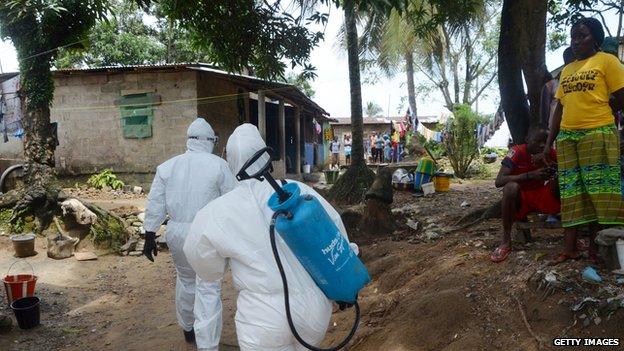Ebola response lethally inadequate, says MSF
- Published
"It is impossible to keep up with the sheer number of infected people pouring into our facilities" Medecins san Frontier head Joanne Liu explains the scale of the crisis
A global military intervention is needed to curb the largest ever Ebola outbreak, according to the medical charity Medecins Sans Frontieres.
In a damning criticism of world leaders, it says the global response has so far been "lethally inadequate".
The charity said countries were turning their back on West Africa and merely reducing the risk of Ebola arriving on their shores.
More than 1,550 people have died in the outbreak which started in Guinea.
At least 3,000 people have been infected with the virus, but the World Health Organization (WHO) has warned that more than 20,000 people are likely to be infected.
'Coalition of inaction'
In a speech to the United Nations, the international president of MSF, Dr Joanne Liu, said repeated calls for help had been ignored.
She said: "Six months into the worst Ebola epidemic in history, the world is losing the battle to contain it.
"Leaders are failing to come to grips with this transnational threat.
"The WHO announcement on August 8 that the epidemic constituted a 'public health emergency of international concern' has not led to decisive action, and states have essentially joined a global coalition of inaction."
MSF said military and civilian teams capable of dealing with a biological disaster were needed immediately as the spread of Ebola "will not be prevented without a massive deployment".

It is calling for more field hospitals with isolation wards to be set up, trained healthcare workers to be sent to the region and air support to move patients and medics across West Africa.
Dr Liu added: "States with the required capacity have a political and humanitarian responsibility to come forward and offer a desperately needed, concrete response to the disaster unfolding in front of the world's eyes.
"Rather than limit their response to the potential arrival of an infected patient in their countries, they should take the unique opportunity to actually save lives where immediately needed, in West Africa."
The charity said that at one site in Monrovia, in Liberia, it had been able to set up an isolation facility with 160 beds, but said they were "overwhelmed" with growing queues and needed an additional 800 beds.
In other developments:
31 people have now died from a separate Ebola outbreak in the Democratic Republic of Congo, says the World Health Organization, external (WHO)
The UN's Food and Agriculture Organization has warned outbreak is putting food harvests in West Africa "at serious risk".
Nurses in Liberia's largest hospital are on strike, refusing to return to work until they are issued with protective equipment
After a Guinean student with Ebola escaped from a clinic in his homeland and took Ebola to Dakar, Senegal's president said if the student were not sick "he would be before the courts"
Ivory Coast's government allows Sierra Leone's football team to play an Africa Nations Cup qualifier in Abidjan despite the travel ban imposed over the Ebola outbreak
The MSF criticism echoes earlier remarks from the president of the World Bank, Jim Yong Kim.
In a newspaper column, external he said the outbreak would have been easily contained if it had hit a major Western city.
He said the crisis in West Africa was down to a "disastrously inadequate response" from countries with the resources to help.
"We need international organisations and wealthy countries that possess the required resources and knowledge to step forward and partner with West African governments to mount a serious, co-ordinated response," he said.
Also speaking the the United Nations, the director-general of the World Health Organisation Dr Margaret Chan said: "Ebola has become a global threat which requires urgent global efforts in solidarity with the affected countries.
"The outbreak will get worse before it gets better and it requires a well-coordinated big surge and huge scale-up of outbreak response urgently."

Ebola virus disease (EVD)

Symptoms include high fever, bleeding and central nervous system damage
Spread by body fluids, such as blood and saliva
Fatality rate can reach 90% - but current outbreak has mortality rate of about 55%
Incubation period is two to 21 days
There is no proven vaccine or cure
Supportive care such as rehydrating patients who have diarrhoea and vomiting can help recovery
Fruit bats, a delicacy for some West Africans, are considered to be virus's natural host
